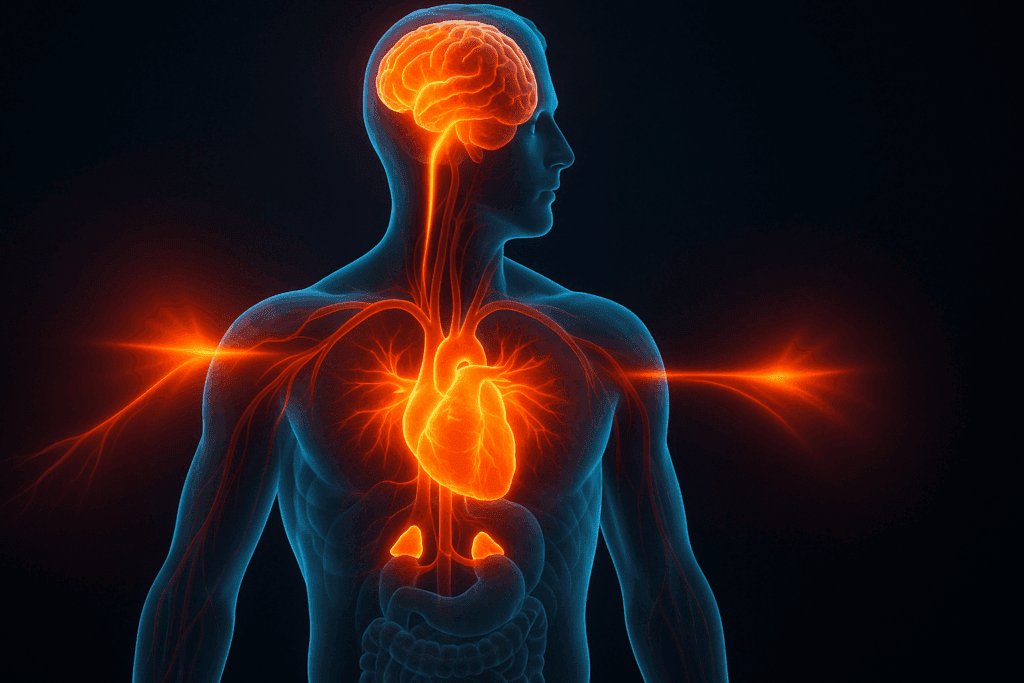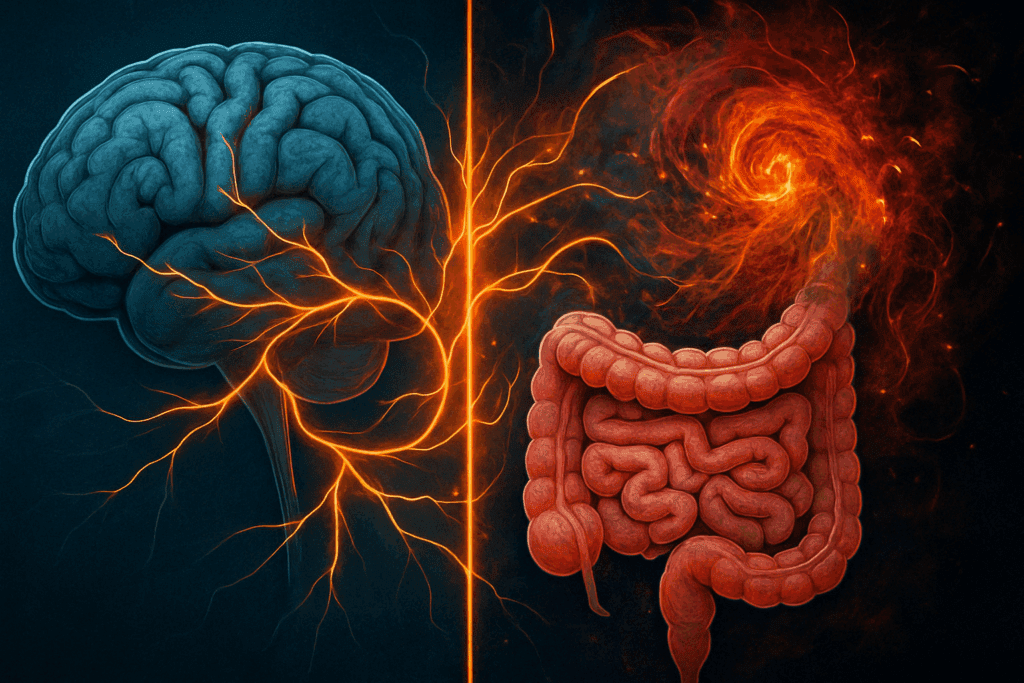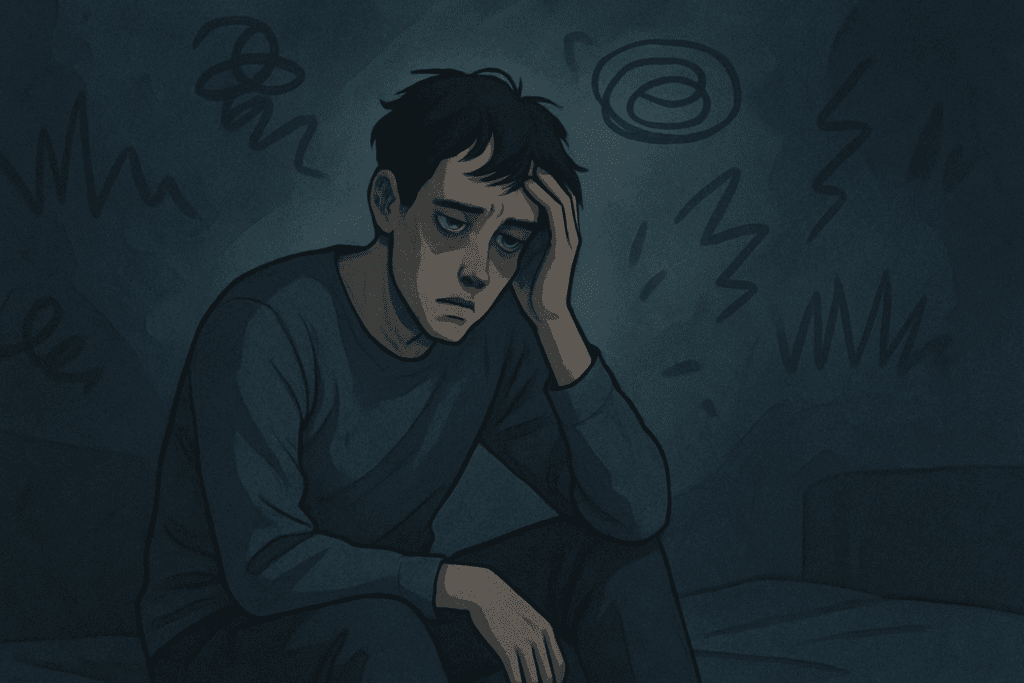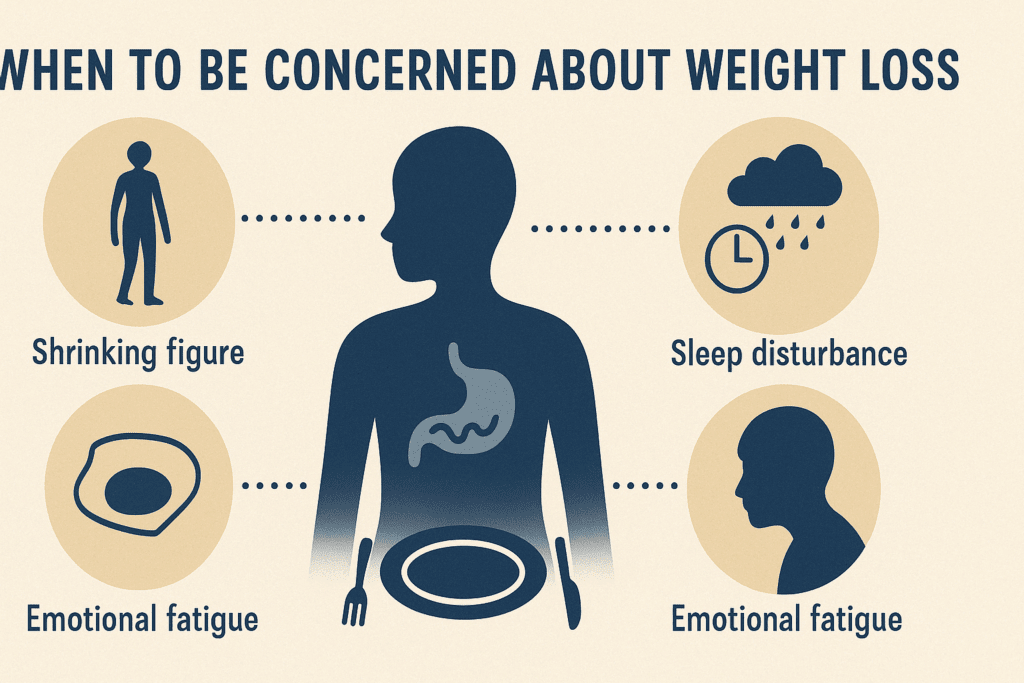Stress is often seen as an invisible adversary, one that can shape and shift the landscape of our physical and mental health without obvious signs. Among the lesser-discussed but increasingly observed consequences of chronic stress is unintentional weight loss. This connection, though complex, is gaining attention as more individuals report dropping pounds without changing their diet or physical activity levels. The question naturally arises: can stress cause weight loss? And if so, how does chronic anxiety fit into this dynamic?
You may also like: How to Stop Emotional Eating and Regain Control: Mindful Nutrition Strategies That Support a Healthier Lifestyle
The connection between stress and weight loss is not just anecdotal—it’s physiological, psychological, and behavioral. As the body’s response system becomes activated by prolonged stress, changes in metabolism, hormone levels, appetite, and digestive function begin to occur. For some, these shifts may result in eating more and gaining weight. For others, the opposite happens—they lose weight due to stress, sometimes rapidly and without conscious effort. This article explores this phenomenon in depth, delving into the biological mechanisms at play, the mental health implications, and the lifestyle factors that mediate the relationship between stress and weight loss. It also offers practical strategies for recognizing and addressing unintentional weight loss linked to emotional distress.

The Physiology of Stress: How the Body Responds
To understand how stress and weight loss are connected, it’s essential to first comprehend how the body responds to stress. When an individual encounters a stressful situation, the brain signals the release of stress hormones such as cortisol, adrenaline, and norepinephrine. These hormones prepare the body for a fight-or-flight response, increasing heart rate, redirecting blood flow to vital organs, and sharpening mental alertness. While these changes are beneficial in acute stress situations, prolonged exposure to stress hormones can alter physiological functioning in detrimental ways.
Cortisol, often referred to as the “stress hormone,” has a nuanced role in weight regulation. In some people, high cortisol levels can increase appetite and cravings for high-fat, high-sugar foods, potentially leading to weight gain. However, in others, elevated cortisol levels may suppress appetite entirely. This loss of interest in food can be particularly pronounced when stress is accompanied by anxiety, a condition that can heighten gastrointestinal sensitivity and lead to symptoms like nausea, abdominal discomfort, and early satiety.
When stress becomes chronic, the body’s regulatory systems may shift into a new equilibrium, one where digestive processes are compromised. The body might prioritize other survival mechanisms over nutrient absorption, leading to a net caloric deficit despite normal or even increased food intake. This physiological shift helps explain why some individuals experience pronounced and unexplained weight loss under stress.

Behavioral Changes and Appetite Suppression
In addition to its physiological effects, stress often brings about significant behavioral changes that can contribute to weight loss. When someone is overwhelmed by stress or anxiety, their routine—including meal timing and portion control—can become disrupted. Meals may be skipped or replaced with insufficient snacks, and interest in preparing or eating food can wane. For some, the simple act of eating may feel burdensome or even repulsive during periods of heightened anxiety.
Sleep disturbances, another common outcome of chronic stress, can further affect eating habits and metabolic health. Poor sleep can dysregulate the hormones ghrelin and leptin, which are responsible for hunger and satiety cues. While many people with sleep deprivation report increased hunger, those who are anxious and stressed may instead experience a marked decrease in appetite. This divergence illustrates how individual differences and coping mechanisms can lead to vastly different outcomes.
Social withdrawal, a frequent companion of chronic stress, may also indirectly contribute to losing weight from stress. Eating is often a social activity, and people experiencing anxiety may isolate themselves from situations involving food, such as family dinners or lunch with coworkers. This self-imposed isolation can reduce overall food intake without the individual realizing the extent of their nutritional deficit.

The Role of Anxiety in Digestive Function
Beyond appetite changes, stress and anxiety can significantly impact digestive health. The gut-brain axis, a bidirectional communication pathway between the gastrointestinal tract and the central nervous system, plays a pivotal role in mediating the effects of stress on digestion. Chronic anxiety can lead to gastrointestinal disorders such as irritable bowel syndrome (IBS), which is frequently associated with unintentional weight loss due to malabsorption, diarrhea, or frequent bowel movements.
Stress can also influence the composition and function of the gut microbiome, the community of bacteria and microorganisms that assist in digestion and immune regulation. Emerging research suggests that a disrupted microbiome may contribute to both weight loss and weight gain, depending on the individual’s stress response and dietary habits. For some, chronic stress may lead to reduced microbial diversity and increased inflammation in the gut, compromising nutrient uptake and exacerbating gastrointestinal symptoms.
When individuals lose weight due to stress, it’s often a combination of reduced food intake, increased energy expenditure (as the body remains in a heightened state of alert), and compromised digestive efficiency. Together, these factors create a metabolic environment where weight loss becomes not only possible but inevitable if stress is not properly managed.

Psychological and Emotional Consequences
The emotional toll of losing weight from stress should not be underestimated. While weight loss is often celebrated in popular culture, unintended and uncontrolled weight loss is frequently a sign of underlying distress and may contribute to further psychological complications. People experiencing this phenomenon may feel confused or frustrated by their inability to maintain a healthy weight, especially when their weight loss is accompanied by fatigue, weakness, or difficulty concentrating.
For individuals with a history of disordered eating or body image issues, stress-related weight loss can be particularly triggering. It may reinforce unhealthy relationships with food or body weight, complicating efforts toward recovery and self-care. Mental health professionals often emphasize the importance of addressing not just the physical symptoms of weight loss, but also the cognitive and emotional patterns that underlie them.
Moreover, the societal pressure to remain productive and resilient can make it difficult for individuals to seek help. Many people may dismiss their own symptoms, rationalizing their weight loss as a result of a “busy lifestyle” or assuming it will resolve on its own. Unfortunately, without intervention, stress-related weight loss can lead to nutrient deficiencies, immune system compromise, and even long-term health complications.

When to Be Concerned About Weight Loss
While weight fluctuation is normal over time, losing weight from stress at a rapid pace or without trying should prompt a deeper evaluation. A weight loss of more than 5% of body weight over a period of six to twelve months—especially if it occurs without dietary or exercise changes—warrants medical attention. This is particularly true when accompanied by symptoms such as digestive discomfort, sleep problems, mood changes, or persistent fatigue.
Medical professionals typically assess unintentional weight loss through a comprehensive evaluation, including a review of recent life stressors, mental health status, dietary intake, and laboratory tests to rule out other causes such as hyperthyroidism, diabetes, or malignancy. When stress or anxiety is identified as the primary driver, treatment may involve a multidisciplinary approach that includes nutritional counseling, psychological support, and stress management techniques.
It’s important to note that the presence of stress does not exclude other medical conditions. For this reason, individuals experiencing unexplained weight loss should avoid self-diagnosing and instead seek guidance from healthcare providers who can offer a full evaluation and tailored treatment plan.

Holistic Strategies for Managing Stress and Maintaining Healthy Weight
Addressing the underlying causes of stress is essential not only for emotional well-being but also for restoring a healthy weight. Stress management begins with identifying the sources of stress—whether they are related to work, relationships, finances, or personal expectations—and developing strategies to cope with them constructively. Techniques such as mindfulness meditation, yoga, and deep-breathing exercises have been shown to reduce stress hormone levels and improve overall mood.
Nutrition plays a central role in buffering the body against the effects of chronic stress. Eating regular, balanced meals that include protein, complex carbohydrates, and healthy fats can help stabilize blood sugar levels and support neurotransmitter production, which is crucial for regulating mood and appetite. In some cases, working with a registered dietitian or nutritionist can help individuals create a personalized eating plan that accounts for both their physical and emotional needs.
Sleep hygiene is another critical component of stress management. Prioritizing restful sleep—by maintaining a consistent bedtime routine, limiting screen time before bed, and creating a calming sleep environment—can enhance resilience to stress and improve appetite regulation. Individuals who struggle with insomnia or disrupted sleep due to anxiety may benefit from cognitive behavioral therapy for insomnia (CBT-I), which addresses the behavioral and cognitive factors contributing to poor sleep.
The Importance of Social Support and Professional Help
One of the most effective antidotes to stress is human connection. Talking with trusted friends, family members, or support groups can provide emotional relief and perspective, reducing the sense of isolation that often accompanies chronic anxiety. Sharing meals with others, even virtually, can help re-establish healthy eating patterns and create accountability around self-care practices.
For many individuals, professional help is an essential part of recovery. Therapists who specialize in anxiety disorders can offer evidence-based interventions such as cognitive behavioral therapy (CBT), exposure therapy, or acceptance and commitment therapy (ACT) to help individuals better understand and manage their stress responses. In cases where stress is severely impacting appetite and nutrition, consultation with a clinical psychologist or psychiatrist may be appropriate.
Incorporating regular physical activity can also be beneficial, though it should be approached mindfully when weight loss is a concern. Rather than focusing on burning calories, exercise should be viewed as a tool for emotional regulation and mood enhancement. Activities such as walking, swimming, or gentle stretching can activate endorphins, reduce cortisol levels, and restore a sense of bodily control without exacerbating weight loss.
Exploring the Long-Term Implications of Chronic Stress
Over time, losing weight from stress can set off a cascade of health challenges if not properly addressed. Chronic nutritional deficiencies may impair immune function, making the body more susceptible to illness. Prolonged undernourishment can weaken bones, reduce muscle mass, and disturb cardiovascular health. Moreover, persistent anxiety can contribute to the development or worsening of conditions like depression, which can further complicate recovery and lead to cycles of avoidance or self-neglect.
Understanding these long-term implications reinforces the importance of early intervention. Preventing a downward spiral begins with recognizing that stress-related weight loss is not merely a cosmetic issue, but a health concern with potential ramifications across multiple systems of the body. By prioritizing both mental health and nutritional well-being, individuals can work toward a more balanced and sustainable state of health.
Frequently Asked Questions: Understanding Stress and Unintended Weight Loss
1. Can emotional trauma from past experiences lead to long-term weight changes even years later?
Yes, unresolved emotional trauma can have a lasting impact on the body’s stress response system, potentially contributing to chronic physiological changes that affect weight. The body may continue to react to subtle emotional triggers with a fight-or-flight response, resulting in appetite suppression or digestive issues. Over time, this can create a pattern where individuals lose weight due to stress without actively recognizing the underlying emotional cause. While acute stress typically causes short-term changes, chronic psychological trauma may lead to prolonged cycles of losing weight from stress. Addressing trauma through therapy and emotional regulation techniques can help the body return to a more balanced metabolic state.
2. How does workplace burnout specifically affect eating habits and body weight?
Workplace burnout often leads to a persistent state of mental exhaustion, which in turn reduces appetite and disrupts normal meal routines. Employees experiencing burnout may skip meals, rely on caffeine to suppress hunger, or feel too overwhelmed to prepare balanced meals. These patterns may result in people unintentionally losing weight from stress related to career pressures. Furthermore, a loss of work-life boundaries may cause chronic activation of the stress response, further disturbing metabolic function. This environment reinforces the connection between stress and weight loss, particularly when nutritional needs are deprioritized amid professional demands.
3. Are there gender differences in how people lose weight due to stress?
There is growing evidence suggesting that gender plays a role in how individuals experience and respond to stress-related weight changes. While both men and women can lose weight due to stress, women are more likely to report appetite suppression and gastrointestinal distress, whereas men may engage in stress-reducing behaviors like increased physical activity or skipping meals unintentionally. Hormonal fluctuations in women, such as those related to menstrual cycles or menopause, may further exacerbate their vulnerability to losing weight from stress. Additionally, societal expectations and gender-specific coping strategies may influence eating behaviors during high-stress periods.
4. Can stress-related weight loss be reversed without medication?
In many cases, yes—stress-related weight loss can often be reversed through a combination of lifestyle interventions rather than pharmaceutical solutions. Restoring a regular eating schedule, improving sleep hygiene, and practicing stress management techniques such as mindfulness or breathwork can gradually support weight restoration. People who lose weight due to stress often need emotional support and structure more than medication. Nutritional therapy, especially when tailored by a registered dietitian, can help the body recover and re-establish proper digestion and metabolism. However, if underlying anxiety or depressive symptoms are severe, a mental health professional should evaluate whether therapy or medication may also be necessary.
5. What role does the gut microbiome play in stress and weight loss?
The gut microbiome, which consists of trillions of bacteria and microorganisms, has a powerful impact on how the body processes stress and nutrients. Chronic stress can reduce microbial diversity, leading to inflammation and compromised digestion. When this occurs, individuals may begin losing weight from stress because their bodies are less efficient at absorbing nutrients. A disrupted microbiome can also influence mood and behavior, compounding the cycle of stress and weight changes. Restoring gut health through prebiotics, probiotics, and a fiber-rich diet may help stabilize the microbiome and improve overall resilience to stress-induced weight fluctuations.
6. Can someone be unaware that stress is the reason for their weight loss?
Absolutely. Many people experiencing stress may not associate it with physical symptoms like weight loss, especially if their emotional distress is low-grade or has become normalized. Subtle signs, such as a decreased desire for food or increased stomach discomfort, may be brushed off as minor issues. However, these are common ways the body signals that it’s under chronic strain. In such cases, individuals may lose weight due to stress without identifying it as the root cause. A holistic self-assessment or consultation with a healthcare provider can help uncover whether emotional stress is influencing physical health.
7. Are there certain personality traits that make someone more likely to lose weight from stress?
Yes, personality traits such as high sensitivity, perfectionism, and a tendency toward internalization of emotions may predispose individuals to stress-related weight changes. People who internalize stress often experience it physically, which may manifest in reduced appetite, digestive upset, or sleep disturbances. These traits can amplify the likelihood of losing weight from stress, especially when combined with high external demands and poor coping mechanisms. Developing emotional awareness and resilience through counseling or self-reflective practices can help mitigate the physiological impact of these personality-driven stress responses.
8. How do cultural expectations influence how people respond to stress and changes in weight?
Cultural norms around productivity, body image, and emotional expression can heavily shape how individuals interpret and respond to weight changes due to stress. In cultures that glorify thinness or associate weight loss with self-discipline, unintended weight loss may be misinterpreted as a positive sign rather than a warning. This mindset can discourage individuals from seeking help, even when they’re clearly losing weight from stress. Additionally, cultural taboos around discussing mental health may prevent people from acknowledging their emotional struggles. Promoting culturally sensitive education around stress and weight loss can help de-stigmatize these issues and encourage proactive care.
9. What are the long-term health risks of ignoring stress-related weight loss?
Unaddressed stress-related weight loss can lead to a host of long-term complications, including nutritional deficiencies, weakened immunity, muscle wasting, and hormonal imbalances. Over time, this can result in chronic fatigue, decreased bone density, and impaired cognitive function. If someone continues to lose weight due to stress, they may become more susceptible to infections or long-term metabolic conditions. Additionally, the emotional toll of chronic stress can contribute to anxiety or depression, further perpetuating the cycle. Taking early action to investigate and treat weight loss ensures better outcomes both physically and mentally.
10. Are there emerging therapies or research trends focused on preventing stress-induced weight loss?
Yes, several emerging approaches aim to address the growing recognition of how psychological stress influences metabolic health. Innovations in personalized nutrition and digital health monitoring are helping individuals track early signs of unintentional weight changes. Wearable technology that tracks heart rate variability, sleep quality, and digestive patterns may help identify when someone is at risk of stress-related weight shifts. Additionally, psychobiotics—probiotics designed to support mental health through the gut-brain axis—are being explored as a novel intervention for those who lose weight from stress. These promising developments point to a future where multidisciplinary care models can more effectively prevent and reverse stress and weight loss patterns.
Final Thoughts on Stress, Anxiety, and Unintended Weight Loss
Recognizing the link between stress and weight loss is a critical step toward achieving holistic well-being. While some may initially view weight loss as a welcome side effect of a high-pressure lifestyle, it often signals deeper issues that require attention and care. Chronic anxiety and prolonged stress can subtly yet powerfully erode the body’s natural balance, leading to changes in appetite, digestion, and metabolic function that ultimately result in unintentional weight loss.
It is essential to approach this topic with compassion and scientific rigor, acknowledging that losing weight from stress is not a matter of willpower or personal failure. Instead, it is a complex interplay of hormonal, behavioral, and emotional factors that call for comprehensive support. By understanding how chronic stress influences the body, individuals and healthcare providers can work together to develop strategies that not only restore physical health but also nurture mental resilience.
If you or someone you know is experiencing unexplained weight loss alongside signs of chronic anxiety, seeking professional support is not only appropriate—it is essential. Early recognition, evidence-based interventions, and compassionate care can make all the difference in restoring both nourishment and peace of mind. In today’s fast-paced world, learning to recognize the body’s signals and respond with thoughtful, holistic care is one of the most powerful forms of self-preservation and growth.
Was this article helpful? Don’t let it stop with you. Share it right now with someone who needs to see it—whether it’s a friend, a colleague, or your whole network. And if staying ahead on this topic matters to you, subscribe to this publication for the most up-to-date information. You’ll get the latest insights delivered straight to you—no searching, no missing out.
Further Reading:
Can stress lead to weight loss?
8 Reasons Anxiety Can Cause Weight Loss & How to Cope
Stress and Weight Loss: What’s the Connection?
Disclaimer
The information contained in this article is provided for general informational purposes only and is not intended to serve as medical, legal, or professional advice. While NewsHealthWatch strives to present accurate, up-to-date, and reliable content, no warranty or guarantee, expressed or implied, is made regarding the completeness, accuracy, or adequacy of the information provided. Readers are strongly advised to seek the guidance of a qualified healthcare provider or other relevant professionals before acting on any information contained in this article. NewsHealthWatch, its authors, editors, and contributors expressly disclaim any liability for any damages, losses, or consequences arising directly or indirectly from the use, interpretation, or reliance on any information presented herein. The views and opinions expressed in this article are those of the author(s) and do not necessarily reflect the official policies or positions of NewsHealthWatch.

